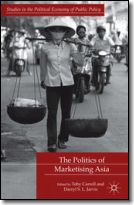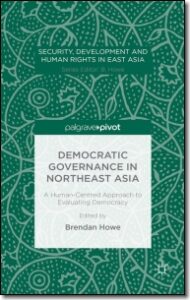Studies in the Political Economy of Public Policy

Darryl S.L. Jarvis
APISA Series Editor
Contact Details:
Prof. Darryl S.L. Jarvis
Department of Asian and Policy Studies
The Hong Kong Institute of Education
E-mail: darryl.jarvis[at]apisa.org

M. Ramesh
APISA Series Editor
Contact Details:
Prof. M. Ramesh
Lee Kuan Yew School of Public Policy, Singapore
E-mail: m.ramesh[at]apisa.org
Security, Development and Human Rights in East Asia

Brendan Howe
APISA Series Editor
Contact Details:
Prof. Brendan Howe
Graduate School of International Studies, Ewha Womans University, Korea
E-mail: brendan.howe[at]apisa.org
APISA Publication Series
APISA has three publication series published by Palgrave Macmillan:
Studies in the Political Economy of Public Policy
Studies in the Political Economy of Public Policy presents cutting edge, innovative research on the origins and impacts of public policy. Going beyond mainstream public policy debates, the series encourages heterodox and heterogeneous studies of sites of contestation, conflict and cooperation that explore policy processes and their consequences at the local, national, regional or global levels. Fundamentally pluralist in nature, the series is designed to provide high quality original research of both a theoretical and empirical nature that supports a global network of scholars exploring the implications of policy on society.
The series is supported by a diverse international advisory board drawn from Asia, Europe, Australia, and North America, and welcomes manuscript submissions from scholars in the global South and North that pioneer new understandings of public policy.
If you have a project that may fit with the series, you can contact Darryl S.L. Jarvis or M. Ramesh, the APISA Series Editors.
Recent publications:
The Politics of Marketising Asia
Edited by Toby Carroll and Darryl S.L. Jarvis

Economic growth continues to transform the economic and political landscape of Asia. Equally the policies now being adopted to promote private sector participation, re-structure state entities, and reduce the presence of the state in the provision of public goods and services, are tied to fundamental transformations in Asia's state-society relations. The global cast of contributors present a timely analysis of the impact of neo-liberalism on Asia's developmental policies and the organisation of Asian states and markets. Ironically, the "developmental state" that has historically driven Asia's rapid economic transformation is now threatened by an increasingly dominant neoliberal agenda that aims to roll back the state in the name of market fundamentalism.
Link to publisher
Security, Development and Human Rights in East Asia
Download document in PDF
This series focuses on the indissoluble links uniting security, development and human rights as the three pillars of the UN, and the foundation of global governance. It takes into account how rising Asia has dramatically impacted the three pillars at the national, international and global levels of governance, but redirects attention, in this most Westphalian of regions, to human-centered considerations. Projects submitted for inclusion in the series should therefore address the nexus or intersection of two or more of the pillars at the level of national or international governance, but with a focus on vulnerable individuals and groups. The series targets postgraduate students, lecturers, researchers and practioners of development studies, international relations, Asian studies, human rights and international organizations.
This series focuses on the indissoluble links uniting security, development and human rights as the three pillars of the UN, and the foundation of global governance. It takes into account how rising Asia has dramatically impacted the three pillars at the national, international and global levels of governance, but redirects attention, in this most Westphalian of regions, to human-centered considerations. Projects submitted for inclusion in the series should therefore address the nexus or intersection of two or more of the pillars at the level of national or international governance, but with a focus on vulnerable individuals and groups. The series targets postgraduate students, lecturers, researchers and practioners of development studies, international relations, Asian studies.
If you have a project that may fit with the series, you can contact Brendan Howe, the APISA Series Editor.
Recent publications:
Democratic Governance in Northeast Asia
A Human-Centred Approach to Evaluating Democracy
Edited by Brendan Howe

Comprising case studies of Japan, South Korea, and Taiwan, this edited volume explores the key characteristics of democratic governance in Northeast Asia. Each democracy is assessed on the extent to which it enables the flourishing of social capital; prioritizes the interests of all as characterized by freedom from fear and want; and empowers all to participate in the democratic process and governance. With particular focus on the experience of minorities, this volume contends that the acid test of democratic governance is not how well the government represents the interests of the elites, or even the majority, but rather how it cares for the needs of vulnerable groups in society.
Link to publisher
Devielopment Cooperation and Non-Traditional Security in the Asia-Pacific
The Development Cooperation and Non-Traditional Security in the Asia-Pacific series is a further publication series and will be launched in 2015 and managed by the Human Security Program of APISA.





